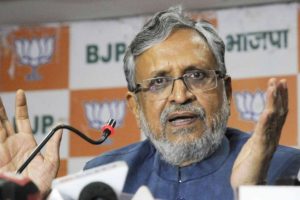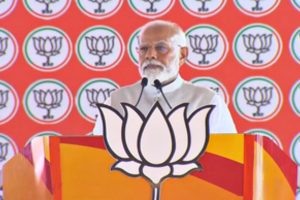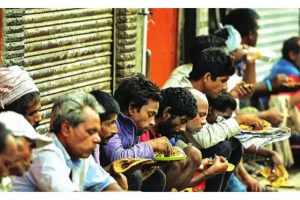The Prime Minister while declaring lockdown in his speech on 24 March rightly advised the nation to be compassionate to the unorganized work force and declared that one of his top-most priorities was to reduce the difficulties in their lives.
The nation, ‘We, the People’ provided unprecedented support to the Prime Minister in all his initiatives in this fight against this pandemic.
The fight is still going on but the new normal of easing out various sectors poses serious challenges to the work force in the country.
This pandemic, in addition to the serious threat to public health and the unprecedented economic and social disruption threatens long-term livelihoods and well-being of billions.
International Labour Organization (ILO), an organ of United Nations has estimated that almost 1.6 billion informal economy workers are significantly impacted by the Covid-19 pandemic across the world, leading to a 60 per cent decline in their earnings.
For these workers, staying home means losing their jobs and for many, it also means losing their livelihoods.
ILO has recommended four pillars of actions to lessen the impact of Covid-19 on business, jobs and the most vulnerable members of society. Pillar 1 includes active fiscal policy, accommodative monetary policy and lending and financial support to specific sectors including the health sector.
Pillar 2 includes extension of social protection for all, implementation of employment retention measures and to provide financial/tax and other relief for enterprises.
Pillar 3 includes adaption of work arrangements (e.g. teleworking), to prevent discrimination and exclusion, to expand access to paid leave and Pillar 4 defines using social dialogue between Government, workers and employers to find solutions.
Labour falls in the concurrent list and there are more than 40 laws enacted by the Central Government.
The UP Government has cleared the ‘Uttar Pradesh Temporary Exemption from Certain Labour Laws Ordinance, 2020’ to exempt all establishments, factories and businesses from the purview of all but three labour laws and one provision of another Act, for a period of three years.
Only the Building and Other Construction Workers Act, 1996, the Employee’s Compensation Act, 1923, the Bonded Labour Act, 1976 and Section 5 of the Payment of Wages Act, 1936 (the right to receive timely wages) will apply in the entire state.
Such liberty apparently has been proposed to provide flexibility to employers and to the foreign investors to shift their manufacturing units from China to the State.
But such suspension of labour laws to empower employers with ‘hire and fire’ power may prove counter-productive and cause fall of labour standards, as internationally accepted and held by our legal system, and will deprive the workforce of its Right to life and livelihood as guaranteed by Article 21 of our Constitution and recognized by the Supreme Court in judgment after judgment.
Such law will also lower the Human Development Index, besides being antithetical to the assurances pledged by our Prime Minister in his speeches during lockdown.
India is a founder member of ILO and signatory to all major Conventions and Recommendations mandating freedom of associations and collective bargaining, minimum living wages, acceptable conditions of work including working hours and elimination of discrimination in employment and occupation, prohibition of forced labour and child labour and occupational safety and health in the work place.
Liquidation of standards by an ordinance is reminiscent of the colonial era. Labour Law, whether at international level or in national jurisdiction, is always a tripartite exercise of Government, Employers and Employees through trade unions.
An ordinance through executive whim will destroy the very foundation of law-making in this specialized branch of law where livelihood of the nation is involved.
Stage of economy or the pandemic cannot be a negotiating factor to suspend workers’ rights acquired through years of movements and sacrifices and pledged by our Constitution-makers in Fundamental rights and Directive Principles.
In pursuance to the Recommendations of the 2nd National Commission on Labour, the Central Government is in the process of rationalizing and simplifying labour laws to attract investment and create employment opportunities.
The Commission recommended that changes in Labour laws should be accompanied by a welldefined social security package that will benefit all workers – whether they be in ‘organized’ or ‘unorganized’ sector. Reform in labour law is long overdue and this initiative amidst dissenting views is welcome.
The Wage Code 2019 and the Industrial Relations Code, though not transformative are good steps towards simplification of a complicated labour law regime. Simplification does not include liquidation of existing labour laws to abolish workers’ rights in the guise of revival of postCorona economy.
Women workers would be the worst victims of such liquidation of labour laws. During this Corona lockdown phase, the pathetic plight of inter-state migratory workers , their sufferings and deaths due to apparent failure of governance and lack of coordination between Central and State Governments, State Governments inter se and between Railway and State Governments is unforgivable and reminds us of the inadequacy of preparedness and pro-activeness during the demonetisation episode.
The death of faceless and nameless workers by a speeding goods train in Aurangabad and others in accidents and of hunger is a shame for a Welfare State. Now, after their return to their home states, we need well-structured rehabilitation and reemployment programmes.
These initiatives if properly planned and implemented may transform agriculture and MSME sectors.
A human-centric, self-reliant India must emerge as visualised by the Prime Minister in his 12 May speech. But our policy makers at state level have to reorient their thought to visualize the need of a New India in the post-corona phase. Labour is not a liability, but an asset for development. Around 40 crore workers – roughly 90 per cent of the work force – are in unorganized sectors in India and these enormous human resources need skills and skills upliftment in a post-corona situation. 100 days’ work under MGNREGA scheme is not a comprehensive mechanism to absolve them and to facilitate reforms. Now, we have to consider agrarian reforms on priority basis. Universities, colleges and schools have to be developed as skill-development centres and for research activities to infuse synergy in the rural economy and to make India self-reliant. We have to be vocal for local.
The focus on land, labour, liquidity and laws and emphasis on cottage industries, agriculture, SMEs, home industries and protection of domestic supply chain will reset the economy.
Bharatiya Mazdoor Sangh, the trade union front of RSS and other trade unions including those affiliated to Left parties have condemned the suspension of labour laws by U.P. Government and as reported, similar initiatives taken by other state governments. Such draconian laws have the potency to relegate a section of the organized sector workers to the ranks of the unorganized.
Reforms should empower the nation, not impoverish it. Labour law is a socio-engineering exercise to protect workers against the exploitation by capital. If challenged, these amendments will not stand the test of law. It is a welcome step that a Parliamentary Standing Committee on Labour has sought reply from nine states including U.P. and Gujarat on dilution of labour laws. Industry cannot be pampered at the cost of workers’ rights.
The writer is an Advocate and a labour law expert.











